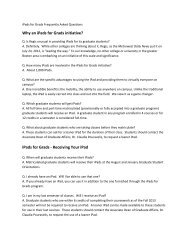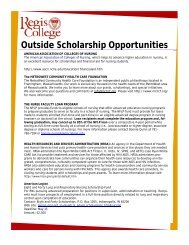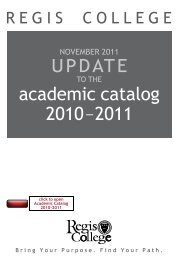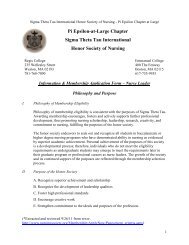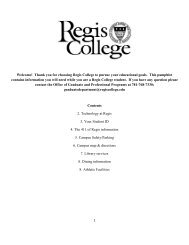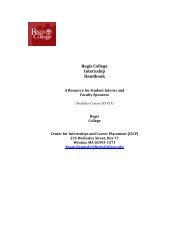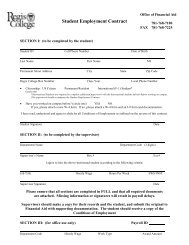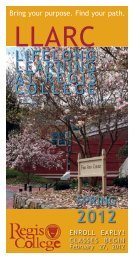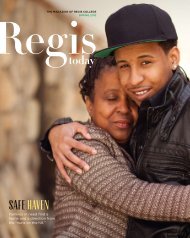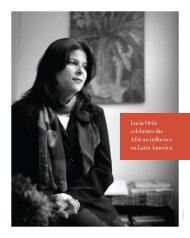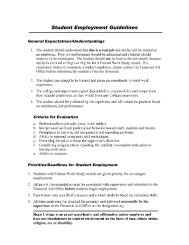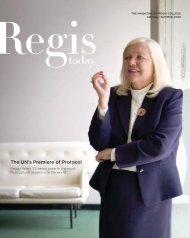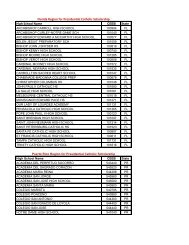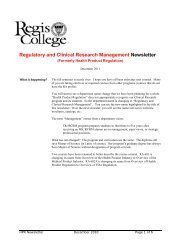class - Regis College
class - Regis College
class - Regis College
Create successful ePaper yourself
Turn your PDF publications into a flip-book with our unique Google optimized e-Paper software.
14<br />
REGIS TODAY<br />
My cancer experience seems<br />
a lifetime ago and when I tell<br />
someone new, I’m always startled<br />
by their wide-eyed reaction. I was<br />
a 37-year-old mother of three, married<br />
to my high school sweetheart<br />
and enjoying a part-time writing<br />
career and new baby. But I was<br />
also very tired and growing thinner<br />
every day. I chalked both up<br />
to a busy life and soldiered on.<br />
And then I felt something.<br />
It was deep within my armpit<br />
(“axilla” as I’d later call it in<br />
hospital-speak) and I knew it<br />
shouldn’t be there. Against my<br />
better judgment, I grasped onto<br />
two misdiagnoses, submitting to<br />
physical therapy for a supposed<br />
pulled muscle and blood tests<br />
for a supposed thyroid disorder.<br />
<br />
I feared all along. I had cancer.<br />
According to my oncologist,<br />
this type of non-Hodgkin’s lymphoma<br />
had an 85 percent chance<br />
of being cured with chemotherapy.<br />
Two months into treatment, even<br />
more thin, tired and now bald,<br />
I learned I was part of the unlucky<br />
15 percent.<br />
Plan B was an autologous stem<br />
cell transplant: a procedure that<br />
uses a patient’s own healthy stem<br />
cells to replace diseased cells. Stem<br />
cells are collected intravenously,<br />
frozen and stored, and high-dose<br />
chemotherapy, intended to destroy<br />
bone marrow and any cancer cells,<br />
follows. Days later, the stored<br />
cells are returned via transfusion,<br />
jump-starting the bone marrow to<br />
begin producing healthy cells.<br />
The term “transplant,” evoking<br />
operating rooms and masked<br />
surgeons, is a misnomer for the<br />
stem cell process. Mine involved a<br />
friendly nurse named Muriel and<br />
several bags of blood. There were<br />
many side effects as my immune<br />
system recovered in an isolated<br />
Boston hospital room, but the<br />
worst was being separated from<br />
my three little girls for 20 days.<br />
Thirty years later, many of Mary’s <strong>Regis</strong> <strong>class</strong>mates rallied to support her during her<br />
“Year of Cancer.” Mary’s roommate Michelle is in the blue vest, Mary is next to her;<br />
the writer, Patti, is behind them in the green.<br />
And that’s what came to my<br />
mind when my old pal Mary began<br />
her cancer journey. Back at <strong>Regis</strong>,<br />
Mary was a wild child, bombing<br />
around campus in an old VW bug<br />
and cracking up us Boston-area<br />
girls with tales of cow tipping in<br />
rural Connecticut. But Mary was a<br />
single mom now with a busy career<br />
and two teenagers and I knew they<br />
<br />
She told them the facts straight<br />
out. “I had a test and there’s<br />
a lump in one breast,” Mary<br />
explained to Patrick, then 17,<br />
and Catherine, 15. “Patrick immediately<br />
asked if it was cancer.”<br />
Mary reassured them the cancer<br />
had been caught early and her<br />
prognosis was good.<br />
“Every year I have a mammogram<br />
and an ultrasound. I almost<br />
skipped 2011’s ultrasound but<br />
thank God I didn’t,” she said. “The<br />
mammogram showed no evidence<br />
of cancer, but the ultrasound<br />
caught it.” A surgical biopsy<br />
revealed good news. The cancer<br />
was stage I and had not spread to<br />
lymph nodes. The tumor was<br />
a treatable ER-positive and Mary<br />
did not have the BRCA2 gene.<br />
“In the beginning, I thought<br />
okay, I’ll have a lumpectomy and<br />
follow up with radiation,” she said.<br />
Further testing, however, showed<br />
the tumor was HER2-positive, a<br />
more aggressive type of breast cancer.<br />
She would receive six rounds<br />
of chemotherapy over 18 weeks,<br />
radiation, and a year of Herceptin,<br />
a drug that targets HER2-positive<br />
cells and reduces recurrence. “It<br />
was a lot to take in,” Mary said.<br />
As Mary steeled herself for<br />
the physical battle, another raged<br />
internally. It was one I remembered<br />
well. “Why me?” she wondered.<br />
“I exercise. I don’t smoke.<br />
I eat healthy. I do everything right<br />
and I still get cancer.” I recalled<br />
my quick recovery and assured



